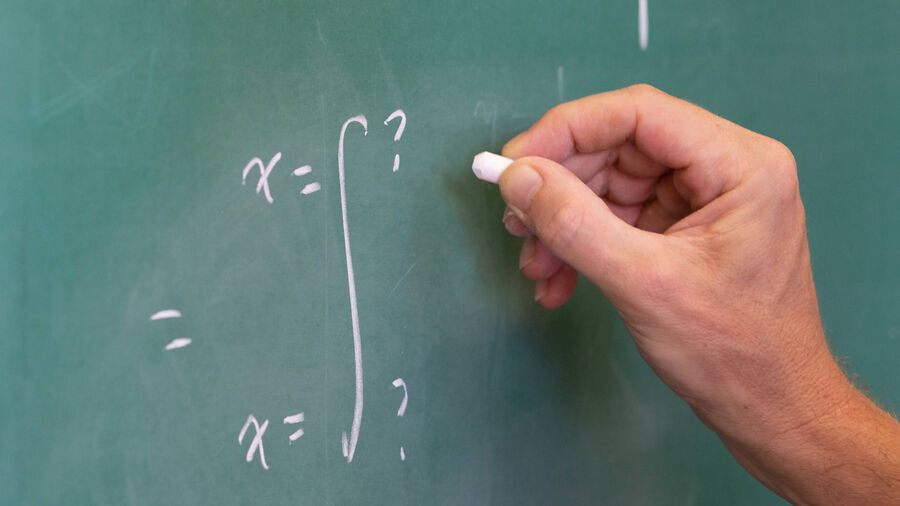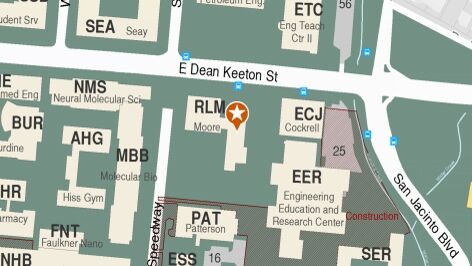Mathematics
Major in the College of Natural Sciences

The Mathematics Department is known throughout the world for its distinguished faculty and stimulating mathematical environment.
It has an excellent research reputation, a strong graduate program and a full range of outstanding undergraduate programs. The department has a long tradition of outreach to schools in central Texas, including the popular Saturday Morning Math Group program that brings extra-curricular education to high school and middle school students and mathematics enthusiasts in Austin and across the state.
In addition, the newly formed award winning Mathematicians of Color Alliance of Texas (MoCAT) is a student-run organization open to anyone interested in promoting the mathematical development and achievements of underrepresented groups. MoCAT works with students, staff, and faculty at UT and the broader community. Mathematics offers a spectrum of degrees, designed for general cultural background, work in industry, teaching, science, as well as for graduate study in mathematics. For additional information on the career field and becoming a mathematician, visit the American Mathematical Society for Students, Mathematical Association of America for Students, UTeach Natural Sciences, Be an Actuary, and Society for Industrial and Applied Mathematics for Students websites.
Freshman and External Transfer Admission
ShowProspective University of Texas at Austin students should visit UT Admissions to learn about the application process and how to declare a major.
Internal Transfer Requirements
ShowStep 1:Internal transfer students must apply to the College of Natural Sciences prior to completing 60 hours or four long semesters at UT. Applications are due to the College of Natural Sciences in the spring. Learn more about the college's internal transfer requirements.
Step 2: Once accepted into the College of Natural Sciences, all students will start as entry-level mathematics majors until they successfully complete the entry-level requirements.
Required Courses
ShowAll degrees will require students to gain a facility with proofs; some have specific requirements such as facility with a computer language. In general, the professional and faculty advisors will help students design a degree program that will meet the student's goals. View the degree requirements for the mathematics major. For additional information, view course descriptions and course syllabi for the Department of Mathematics.
Specializations
ShowMathematics degrees offered include bachelor of arts in mathematics (standard or teaching), bachelor of science and arts, as well as four bachelor of science options. The bachelor of science options are as follows:
Actuarial Science
Mathematics
Teaching
Honors
Within the Bachelor of Science in Mathematics one may choose to focus their upper division mathematics study in pure mathematics, applied mathematics, or statistics, probability, data science, and scientific computation. Advisors are available to help you plan your courses based on your individual academic and career goals.
Personality
ShowStudents are often described as curious and persistent. Depending upon the individual, students often have an interest in a particular area and then utilize quantitative reasoning and logic to study a topic or further draw conclusions from existing research. Students can gain experience outside of the classroom through organizations such as the Association for Women in Mathematics, Actuarial Science Club, Gamma Iota Sigma, Math Club, and Mathematics and Science Teachers of Tomorrow
Skills
Show- Cultivate effective thinking and communication skills applicable in mathematics and well beyond mathematics.
- Develop mathematical independence and experience mathematical inquiry.
- Solve mathematical problems using tools and concepts from core mathematical areas
- Learn key ideas from complementary points of view: continuous and discrete; algebraic and geometric; deterministic and stochastic; exact and approximate.
- Demonstrate proficiency in the comprehension and writing of mathematical proofs.
- Communicate mathematical ideas through symbolic expressions and graphs and be able draw inferences from such presentations of data.
- Appreciate the beauty and power of mathematics.
